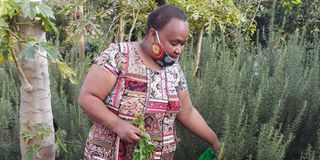I'm well; cancer survivor finding strength in helping others

Ms Jane Frances Angalia was diagnosed with the type of cancer in 2014.
What you need to know:
- Ms Jane Frances Angalia was diagnosed with the type of cancer in 2014. This is after two years of presuming the itchiness on her left armpit was skin reaction from wearing second hand clothes or nylon clothes.
- In the six years, the Public Relations, Communication and Advertising part-time lecturer has had seven surgeries; six done in in India and one in Turkey.
- She has founded Cancer Information Support Network, which collaborates with other cancer associations to offer psychosocial support to cancer patients.
Ms Jane Frances Angalia has such an infectious laughter.
But a minute into conversation with her, you realise the strength of a woman who has for six years battled, triple-negative breast cancer, which accounts for about 10-15 per cent of all breast cancers, American Cancer Society indicates.
She was diagnosed with the type of cancer in 2014. This is after two years of presuming the itchiness on her left armpit was skin reaction from wearing second hand clothes or nylon clothes.
“At that time, the cancer was in stage 3B (meaning it had invaded her breast skin and she had a lump on her left breast) and I had to immediately start chemotherapy,” says Ms Angalia whose breast was finally removed.
And in the six years, the Public Relations, Communication and Advertising part-time lecturer has had seven surgeries. Six done in in India and one in Turkey. She had to take a five-year leave of absence from the lecture halls to take care of her health.
“My oncologist warned me against doing everything as normal as before the diagnosis,” she says.
Source of income
“He advised me to be easy on myself as any strain on my body would be dangerously itching me closer to the grave,” she adds.
Being out of job has meant lack of source of income to meet her medical bills and sustain herself.
It has cost her more than Sh7 million so far, in treating herself; money that has been raised from her savings, selling of her property and family and friends’ frequent contributions.
“I am financially drained as I have spent all I had and sold all my properties. I have nothing left,” says Ms Angalia who was forced to move back to her parents’ home in Nairobi having depleted all her savings.
But left in her is the passion to help other cancer patients cope with the disease.
She has founded Cancer Information Support Network, which collaborates with other cancer associations to offer psychosocial support to cancer patients. They also mobilise food donations and resources to support needy cases.
The network at the same time shares referral information on seeking quality treatment and lobbies for better cancer healthcare.
Reaching out
Not even her bi-weekly chemotherapy stops her from stretching her hand to those who need her help.
“When I feel better after chemotherapy, I go out to visit the sick in hospitals and at homes to encourage them,” she says.
“Nothing fulfils me like reaching out to other women cancer survivors, listen to their pain and do something about their pain,” she says, “It keeps me strong and I always say ‘thank you Lord, I'm well and responding well to treatment.”
During the Covid-19 pandemic, she has fed 300 cancer patients within Nairobi and Kiambu regions thanks to her e-food drives. In her calls, she encourages people to donate food to keep alive cancer patients.
She says 10 cancer patients died between July and September for having lacked food and medication, as their revenue streams dried due to the economic disruptions brought by Covid-19.
She wishes the government would pronounce cancer, a national disaster. She argues that this would draw more funds into the cancer kitty, facilitating free screening of women for all types of cancers.
“Just like when expectant women are tested for HIV, so should women be screened for all types of cancer for free,” she says.





